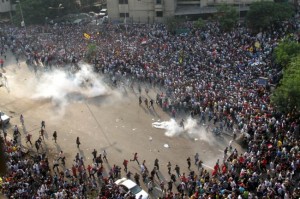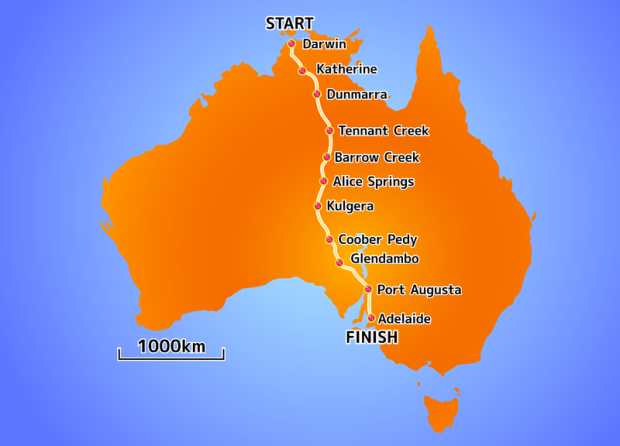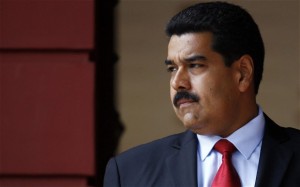Egypt, Australia and Venezuela
Tuesday's World Events — Posted on October 15, 2013
EGYPT – Tourism minister faces uphill battle to attract visitors
 Hisham Zaazou has been Egypt’s tourism minister for 14 months, making him one of the longest serving members of the cabinet. When appointed last year, his challenge was to convince potential visitors and international travel companies that the then-dominant Muslim Brotherhood had no plans to segregate men and women on beaches or to demolish the pyramids and Sphinx despite calls for such radical measures from some vocal Islamists outside official circles.
Hisham Zaazou has been Egypt’s tourism minister for 14 months, making him one of the longest serving members of the cabinet. When appointed last year, his challenge was to convince potential visitors and international travel companies that the then-dominant Muslim Brotherhood had no plans to segregate men and women on beaches or to demolish the pyramids and Sphinx despite calls for such radical measures from some vocal Islamists outside official circles.
But now, after the military ousted Mohamed Morsi, the Brotherhood president, and embarked on a…crackdown…of his supporters, Mr. Zaazou’s biggest hurdle is to persuade the outside world that Egypt is safe to visit.
To that end, he helped free two Canadians held inside an Egyptian jail for weeks, convinced pro-military channels to stop broadcasting “Egypt: War against Terror” logos on their screens 24 hours a day and struggled to convince other countries to remove travel advisories warning their nationals not to visit.

Muslim brotherhood and supporters of ousted president Mohamed Morsi run for cover from tear gas during clashes with riot police along Ramsis street in downtown Cairo, on October 6, 2013.
“There is no place on earth where it’s 100% safe,” he told the Financial Times, citing the terrorist attack on the Boston marathon last year.
Egypt’s ancient monuments and upmarket beach resorts have long attracted tourists, helping fill foreign currency coffers and providing jobs. But a low-level Islamist insurgency against police and mass killings of pro-Morsi protesters by security forces have fed perceptions that the country is on the brink of chaos, damaging a tourism industry that has been suffering since the January 2011 revolution.
Mr. Zaazou calls the losses “quite catastrophic”, especially among those working in the cultural sector. “Their suffering is not from the day the recent travel advisories were issued, but rather starting from January 25, 2011,” he says. “There was no real upswing period.”
He said however he has high hopes that tourism will recover in the next few months. The minister, a technocrat with a decades-long record in the industry, is taking heart from the fact that at least 12 countries, most of them in Europe, have lifted or eased negative travel advisories calling on their citizens to avoid some parts or the whole of Egypt.
“Seventy per cent of the business in recent years has been in the Red Sea and the Southern Sinai, and these areas, as far as the reports that I have, and the proof I have, are quite safe,” says Mr Zaazou. “I am saying quite, and not 100 per cent, because I’ll be honest: there is no place on earth where you can say, there is zero risk there. We did our homework at least for this part of Egypt and I can start promoting it.”
Tourism accounts for about 4 million jobs in Egypt, according to Mr. Zaazou, but the industry has been hit hard by the turmoil since the 2011 revolt which toppled Hosni Mubarak as president. Visitors peaked at 14.7 million in 2010, bringing in $12.5 billion in revenue. After dipping in 2011 to 9 million and $8.8 billion in revenue, the figures started to climb in 2012 to reach 11.5 million tourists and $10 billion in revenue. …
AUSTRALIA – Solar-powered cars in record 2,000 mile Australian outback challenge

Australia: map of World Solar Challenge route.
A Dutch team has travelled almost 2,000 miles without gasoline across the Australian outback in a futuristic solar-powered car to win the World Solar Challenge on Thursday.
The one-person car travelled [1,864 miles] from the top of Australia to the bottom in five days – driving between 8am and 5pm – with an average speed of more than 56 mph. It was powered only by the sun and finished at high speed despite it raining on the way to the finish line in the city of Adelaide.
“We predict every second of the race,” said a spokesman for the winning team, Nuon, from the Delft University of Technology.
“We know exactly what weather is going to be where, how much is going to be in our battery and how much energy we’re going to use with the speed we’re driving at. We actually calculated everything so that our battery would be fully empty finishing here and so that we could drive at the highest speed possible.”
 A Japanese team from Tokai University finished second despite running out of power and having to recharge its batteries north of Adelaide.
A Japanese team from Tokai University finished second despite running out of power and having to recharge its batteries north of Adelaide.
The remainder of the 40-odd international cars in the race finished on Friday (Oct. 11).
The race is held every two years but the cars have been slower this time because they were required to have four wheels rather than three. This forced drivers to be more upright and added to wind resistance and weight.
“It’s a famous race around the world, because it’s the only race for solar cars that take them right across the continent,” an official race observer, Peter Greeneklee, told ABC News. …
VENEZUELA – Nicolas Maduro seeks power to rule by decree

Venezuelan President Nicolas Maduro has asked parliament for decree powers that he says are essential to tackle corruption and fix the economy but opponents view as proof he wants to rule as an autocrat.
Venezuelan President Nicolas Maduro has asked parliament for decree powers that he says are essential to tackle corruption and fix the economy but opponents view as proof he wants to rule as an autocrat.
The National Assembly, where Mr. Maduro’s socialist government has a nearly two-thirds majority, will schedule a vote on the request [this] week and is widely expected to grant him the fast-track legislative powers in a revival of a measure used several times by his predecessor, Hugo Chavez.
Mr. Maduro, 50, says he needs the so-called Enabling Law for 12 months to toughen a crackdown on corruption in the South American OPEC nation as well as tackle economic problems that have become the main challenge of his…presidency.
“We’ve come to ask for decree powers that will give us a solid legal basis to act quickly and firmly against this badness, this sickness,” he said in parliament after arriving to the cheers of supporters who lined streets around the assembly.
“If corruption continues and perpetuates the destructive logic of capitalism, there won’t be socialism here anymore … Corruption must stop being a normal part of our political life.”
Only introducing “extremely severe” punishments for graft could put the country on the right path, he said, urging Venezuelans to reject corruption wherever it originated, in the opposition ranks or among his own “Chavista” supporters. “It’s the same gangsterism, however it’s dressed up.”
Opposition leaders, however, suspect Mr. Maduro will try to use the special powers to attack them and to push through new laws that have nothing to do with the fight against corruption.
In its latest annual index of perceptions of corruption, global watchdog Transparency International ranked Venezuela as the ninth most corrupt country in the world.
Having risen from a Caracas bus driver to Chavez’s vice president, Mr. Maduro won an April election to succeed him after his death from cancer. Opponents mock him as a poor imitation of Chavez, Venezuela’s leader of 14 years, arguing that he is ruining the country by continuing the same model of authoritarian leadership and failed leftist economic policies.
In a long speech that hailed the late Argentine revolutionary Ernesto “Che” Guevara and quoted South American independence hero Simon Bolivar, Mr. Maduro said decree powers would let him “deepen, accelerate and fight until the end for a new political ethic, a new republican life, and a new society.”
(The news briefs above are from wire reports and staff reports posted at The Financial Times on Oct. 14th and London’s Daily Telegraph on October 10th and 9th)
Background
EGYPT:
- Hotels and tour operators have had to drop their prices and attracted more frugal visitors who spend less on tips, souvenirs and optional extras, cutting deep into the incomes of many whose livelihoods depend on tourism. The average amount spent per tourist per night has fallen from $85 to $63, says Mr. Zaazou.
- Street fighting between police and demonstrators in Cairo has scared away visitors to the capital and all but destroyed cultural tourism centred on the Pharaonic monuments. Visitors who used to come to see the pyramids would then proceed to the south, where they travelled by Nile cruise boats between Luxor and Aswan, home of ancient archeological sites such as the Valley of the Kings. Only 30 of the 280 cruise ships that usually sail on the Nile are operating, and their occupancy is just 4%.
- To bypass troubles in Cairo, Mr. Zaazou has signed a deal with Sun Express to fly tourists from German cities directly to Luxor, promoting Nile cruises as combination sun and cultural tours.
- Around 72% of Egyptian tourists come from Europe, including 2.5 million Russians who frequent Red Sea resorts. But Mr. Zaazou says he is eager to draw back big-spending US and Canadian tourists scared off by perceptions of rising anti-American hostility. In 2010, 361,000 Americans visited. “Today there are very little,” Mr. Zaazou says, with dismay. “I would say closer to zero.”
- Many countries and large travel companies follow the lead of the US, which has kept in place a draconian travel advisory warning Americans to avoid Egypt. Part of the problem, according to Mr. Zaazou, is that “This cliché that Egyptians are anti-American does not help me promote tourism,” Mr. Zaazou says. “We need to have a PR campaign in the US to to try and change the impression about the Egyptians and the relationship between Egypt and Americans.”
- The minister’s job will not be helped by the death in custody in recent days of James Henry Dunn, a 66-year-old American, who allegedly hung himself in a prison cell in the Suez Canal city of Ismailiya. He had been held since August on curfew violation charges. (from the article above)
AUSTRALIA - World Solar Challenge:
- The World Solar Challenge or the Bridgestone World Solar Challenge due to the sponsorship of Bridgestone Corporationis a biennial solar-powered car race which covers 3,021 km (1,877 mi) through the Australian Outback, from Darwin, Northern Territory to Adelaide, South Australia.
- The race attracts teams from around the world, most of which are fielded by universities or corporations although some are fielded by high schools. The race has a 20-year history spanning nine races, with the inaugural event taking place in 1987.
- The objective of this competition is to promote research on solar-powered cars. Teams from universities and enterprises participate.
- Efficient balancing of power resources and power consumption is the key to success during the race. At any moment in time the optimal driving speed depends on the weather (forecast) and the remaining capacity of the batteries. The team members in the (normal) escort cars will continuously remotely retrieve data from the solar car about its condition and use these data as input for prior developed computer programs to work out the best driving strategy.
- It is equally important to charge the batteries as much as possible in periods of daylight when the car is not racing. To capture as much solar-energy as possible, the solar panels are generally directed such that these are perpendicular to the incident sun rays. Often the whole car is tilted for this purpose. (from wikipedia)
VENEZUELA:
- Nicholas Maduro is the hand-picked successor of socialist autocratic President Hugo Chavez. He continues Chavez's policies. Having risen from a Caracas bus driver to Chavez's vice president, Mr. Maduro won an April election to succeed him after his death from cancer. Opponents mock him as a poor imitation of Chavez, Venezuela's leader of 14 years, arguing that he is ruining the country by continuing the same model of authoritarian leadership and failed leftist economic policies. (from the article above)
- A gifted, charismatic orator with a keen ability to connect with the poor masses, Mr. Chavez was able to marshal public backing for a series of referendums that created a new constitution and permitted him to bring every important institution – from the legislature to the state oil company – under his control.
- The president also advanced on what he called 21st-century socialism, which included the nationalization of hundreds of companies, the seizure of large land holdings, price controls and currency regulations. In speeches blaming capitalism for society’s ills, Mr. Chavez said his policies had made Venezuela a more prosperous country, independent of U.S. meddling and influence.
- But throughout his presidency, Venezuela’s economy was plagued by blackouts, food shortages and a lack of investment, as government interventions, from price controls to the seizures of land and companies, squelched private enterprise.
- Though his government was blessed by historically high oil prices, with a barrel hitting $150 in 2008, the economy in Venezuela expanded by about 3 percent a year through his presidency, while much of Latin America boomed. (from washingtonpost.com)
